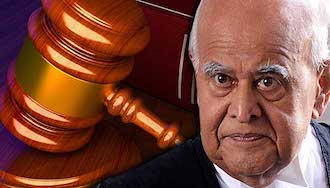
Ex-Sabah anti-graft chief says court should have followed Malaysian Anti-Corruption Commission (MACC) Act 2010, which considers ministers as public officers.
(FMT) – Provisions in the Federal Constitution and the Interpretation Acts have no relevance to determine who is a public officer for the purposes of the tort of misfeasance in public office.
Retired Federal Court judge Gopal Sri Ram said the action brought by Dr Mahathir Mohamad and two others was based on the well-established common law tort.
“It is not brought under an Act of Parliament. It is also not an action brought for violation by the executive of a constitutionally guaranteed right,” he said.
Sri Ram said this in response to High Court Judge Abu Bakar Jais’s ruling yesterday that Prime Minister Najib Razak in not a public officer in public office unlike civil servants.
The judge allowed Najib’s application to strike out the suit by Mahathir, meaning the merit of the case will not be heard.
In the 31-page judgement, Bakar said the Interpretation Acts 1948 & 1967 stated that the phrase “public office” means an office in any of the “public services”.
The judge said Article 132 (1) stated those in the public services were classified groups of civil servants but does not include members of the administration.
Further, he said Article 132(3) stated that the public services excluded the office of any member of the administration in the Federation or state.
The judge said Article 160 (2) clarified that a member of the administration in Putrajaya is meant to be a person holding the office of minister (which includes prime minister), deputy minister or parliamentary secretary and political secretary.
“Clearly the defendant (Najib) is not a member of any services listed in the Constitution.”
“These provisions cumulatively will indicate that Najib is not a public officer and did not hold public office,” the judgment said.
Sri Ram said the judge was wrong to state the prime minister was not a public trustee.
“Every minister in a Parliamentary democracy is a fiduciary with the power to run the government by the people,” he added.
Sri Ram said the tort was not codified into written law but a civil wrong that originated in the common law.
“This tort is committed by a public officer who acts in bad faith or exercises his power for an improper purpose,” he said, adding that this civil wrong has been adopted and applied locally in a number of cases.
“There is therefore a fundamental error in the judgment. And the judge is as wrong as wrong can be.
“It is decisions like this one that puts our judiciary in a bad light in the international legal scene,” he added.
Sri Ram said there was also no need for a court that was confident in its decision to frame its judgment in an apologetic tone.
He said this in reference to two sentences in Bakar’s judgement, which read as follows: “There may be millions who would support and understand why the plaintiffs are suing the defendant. But for all and sundry, it is fundamental to appreciate that a suit can only stand based on law that is applicable.”
Sri Ram said the suit should have gone for trial as there were triable issues.
Meanwhile, lawyer Mohamad Ramli Manan, said a Federal Court in 1979 in the case of “Public Prosecutor -v- Tan Cheng Swee” had held that a public officer was one who discharged any public duty and that he was paid from a public fund.
“He is a public officer if public funds are used to supply his payments and the public have an interest in the duties he discharged,” added Ramli, who is also a former Sabah Anti-Corruption Agency chief.
He said the court should have followed the Malaysian Anti-Corruption Commission (MACC) Act 2010 as it stated that “members of administration” are public officers.
Ramli said civil servants were only one class of public officers.
“Members of the administration, judges, the attorney-general, the auditor-general, the Election Commission members are not members of the public services but they are definitely public officers who discharge public duties,” he said
In their statement of claim filed in March last year, the plaintiffs said Najib interfered to ensure all the relevant authorities discontinued from carrying out investigations into his alleged misconduct over the RM2.6 billion donation and RM42 million from SRC International.
However, Najib filed the action to strike out the suit on grounds that it was unsustainable, frivolous and vexatious.



No comments:
Post a Comment
Note: Only a member of this blog may post a comment.